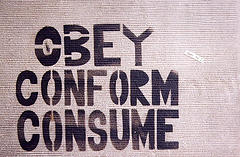
I received an email forward today from an extended family member, and it upset me more than if it had been spam or malware. It was a mal-meme:
This is not sent for discussion. If you agree, forward it. If you don’t, delete it. I don’t want to know one way or the other. By me forwarding it, you know how I feel.
–
I’ll bet this was a surprise to NBC.
NBC POLL
Do you believe that the word God should stay in American culture?
NBC this morning had a poll on this question. They had the highest Number of responses that they have ever had for one of their polls, and the Percentage was the same as this:
86% to keep the words, IN God We Trust and God in the Pledge of Allegiance
14% againstThat is a pretty ‘commanding’ public response.
–
I was asked to send this on if I agreed or delete if I didn’t …..
Now it is your turn. It is said that 86% of Americans believe the word God should stay.
Therefore, I have a very hard time understanding why there is such a mess about having ‘In God We Trust’ on our money and having God in the Pledge of Allegiance.
Why is the world catering to this 14%?
AMEN!
If you agree, pass this on , if not, simply delete.
In God We Trust
A quick check of the net reveals that this isn’t even a real thing.. it’s a fabricated email forward meme from 2004. If there had been such a poll recently, I expect the results would have been far more one-sided. I can’t say which side would have won, though: Internet polls on any religion-vs-secular topic are usually won by whichever side has more poll-crashing trolls online at the time. In a similar fashion, any poll taking suggestions for naming an object will invariably result in “Steven Colbert” winning by an overwhelming majority. The best uncrashed and non-fabricated poll I read about recently had “people of no faith” as the fastest growing segment of the population. So why am I so upset by this? After all, my family sends dumb forwards all the time.
I bristled most at the condescending tone of the author, not even interested in hearing their viewpoint challenged; not even granting that opposing points might be worth a discussion. It’s so unintentionally analogous to proselytizing– [I don’t want to discuss this, just listen to me tell you what is right. Go forth and convert others, or else GTFO]. The fact that people read this and think “Wow, I need to send this to everyone I know” bothers me.
Every time someone reads this, thinks it’s real, and forwards it, doesn’t that mean they, too are having “a very hard time understanding why there is such a mess” about the establishment clause? What attempts do you suppose people make to understand? How hard would it be for someone in the (fake) 86% to find someone in the (fake) 14% and see whether they have any valid points? When you are part of the majority, the minority’s plight may not be immediately apparent, but that makes it no less real or important. The author proposes a simple tyranny of the majority to resolve the issue with a minimum of fuss, and sees absolutely nothing abhorrent in that.
Let’s just have the government support all majorities and back-hand dissenters:
Republicans and Democrats are the only serious choices.
–
Straight people are the backbone of America.
–
This establishment doesn’t serve your kind.
–
Firearms are not for individuals, most households trust the police for protection.
I can imagine a reader who wouldn’t take offense at any of these toy examples, but my point is to illustrate that everyone identifies as part of some minority or other. Where possible we ought to make an effort not to codify prejudice into the laws of the land.
Wishful thinking and unconstitutional legislation notwithstanding, neither our nation nor the universe itself operates according to the god in which you trust.
One response to “Prejudice isn’t a discussion”
It’s crap like this that inspired me to create my own blog… to discuss nonsense polls and “majority” opinion. GTFO indeed.